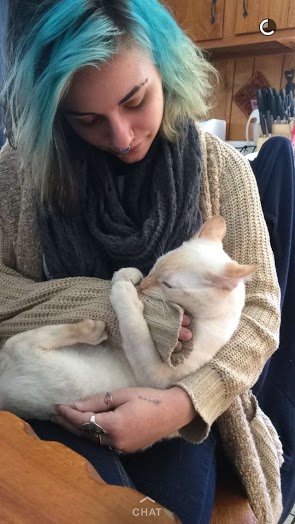By ThompsonTomaszewski
It’s the first day of classes, don’t screw it up. If you do something wrong, they’re going to hate having you for the rest of the semester. It’s only the first day. Don’t screw up.
Walking into the classroom for the first time, I immediately feel three sets of eyes lock onto me. They follow me to my place at the chalk board, and as I turn my back to the eyes in hopes of losing their interest I try to think of something to do while I wait for my professor. I fumble for a piece of chalk, my anxiety and nerves making my fingertips numb and fairly immobile. Shakily, as though for the first time, I write my name on the board.
Cliché. Awesome.
More people funnel into the classroom and my heart is beating so hard that I can feel it in my toes. I start panicking as I fully realize that I am partially responsible for the education of these students. So many expectations and requirements lay behind that realization. I need to do everything just right, or I will be terrible.
How am I going to affect this class, these students? What if I make it worse?
After recently sitting down with Sarah Hart, the professor for whom I was a Teacher’s Assistant last semester, my mind has settled some. When I asked her how she felt I affected the atmosphere and effectiveness of the class, she had quite a bit to say. “I really feel like it improved things. There were some aspects that worked like good cop, bad cop. It’s like it raised the energy level; “Tommy Time” was this break, it was exciting. There was something very appealing and engaging.”
Eden Hodgson, a student in the class, says “I felt like it was fun and more engaging for the entire class. It wasn’t too casual; as a TA you had a very firm hand.”
I have to agree. I think there are so many different measures of effectiveness, and it’s silly of me to think that the answer would be simple. The answer to this question isn’t quantitative by any means. I can’t help but feel like I’ve left a positive impact behind me.
Second day of class. Try not to get too excited about the essay; kids will think you’re weird. Don’t screw up.
The desk that I’m sitting on is cold and hard. I pull my sweater tightly around me and wonder if I’m shivering from the cold or shaking from the nerves. Skeptical eyes are gliding over me again, and smirks from onlookers tell me that I am being judged. Hard.
How am I going to know what I’m doing right? Wrong? Who’s going to tell me?
Sarah tells me that she is blown away by the unexpected success of having a fellow student appear in a teacher’s position. “I found that my class was much more attentive to what you were saying in your lessons than they were to mine. There’s something about having a peer TA that was really powerful, and I’m still not quite sure why.”
Eden tells me how fun and engaging it was. “I liked that you were very involved. With the fundamentals that you were teaching, it was good that you were able to include us.”
Every time you teach, there are flaws in your methods. Even the most successful ones need work. I have lots of room for improvement, but I feel as though I managed to do a few things right along the way.
Third day of class. I think I remember everyone’s name. I might actually be more excited today than I am nervous. Cool. I have butterflies still, though. Sarah’s running late; I should probably start class. Be punctual so they take you seriously. Don’t screw up.
The chalk residue building up on my hands makes me fidget. Trying to wipe it off on my clothes doesn’t help, it only leaves ghostly handprints on my black skirt. My voice rings out over the heads of students, probably in one ear and out the other. I have no trouble projecting and annunciating today.
What are these kids expecting of me? What does Sarah expect?
Sarah says she has hopes rather than expectations. “I hoped that you would be able to find ways of helping at least some students become better writers.” She tells me how I exceeded any expectations that she should have had: I was timely, I was organized, I was on top of the process of it.
Eden explains her preconceived notions. “I thought at first that you would be kind of a quiet standing member in the corner of the classroom, just there to answer questions about whatever writing thing we were working on. Then you started doing fundamentals and it was really interesting to see how you were able to plan lessons and actually teach us stuff.”
I predicted one of two outcomes: One, I would fail miserably, kids would hate me, and I would disappoint Sarah; Two, I would be perfect. My expectations, due to lack of experience, leaned towards the first. I never expected so much gray area. As a student, I usually love my professors or I don’t, so I expected my teaching experience to be similar. As a teacher, though, I was just aiming blindly in the middle.
Halfway through the semester already. I should remember to tell the class how well they did on the last assignment. They’ve made a lot of progress. Okay, deep breath. Sarah won’t be here today, so don’t screw up.
Students are working on the in class assignment. All I can hear is the scratching of ballpoint pens on paper and a few exhausted sighs. I try to walk casually around the room to see if anyone needs help. When I start to feel too overbearing I return to the chalk board. Time is up, so I collect the assignment and start my lesson.
I can’t believe Sarah trusts me with her class alone. How does she feel about stepping back so much?
“Hard! I think I did terribly!” she almost shouts as I ask her how that experience was for her. Sarah tells me that she wishes she had asked me what I wanted to get out of this so that she could have altered her presence based on my needs. Almost apologetically, she says “I didn’t think about how this was a learning experience for you; it was a class of a completely different nature: how to teach.”
Eden believes that it was easy having a peer as a TA due to their experience working with the professor. “I felt like you served as a translation for Sarah specifically, and a lot of other professors could use that sort of student perspective. I definitely think that it’s something Paul Smith’s can benefit from.”
I am so appreciative of the wiggle room that Sarah provided me. As a professor, your class is your baby. You decide the lessons, what to read, what assignment to give, how the material will be presented. I never thought that she would actually allow me to fully teach her class once a week. Granted, content and some of the method of delivery was pre-approved before every class, but she only interrupted my lessons now and then, usually only when she could see me struggle with something. Sarah was so concerned about giving me room; she has taught many classes, but she’s never had to teach someone how to be a teacher. In my opinion, she was beautifully balanced.
As nerve wracking and stressful as this experience was, I learned more than I imagined I would and had more fun than I thought was possible while teaching fundamentals of grammar.
I learned that teaching is not black and white. Not even close. What works with one student will almost never work for the student sitting next to them.
Teaching is fun. End of story.
Students want to learn, and it can be frustrating and heartbreaking to see them struggle when they are trying their hardest.
No matter how many times you explain its importance, there will always be at least one student who refuses to use the oxford comma.
Sarah recommends that students in this type of position remain flexible, seek feedback, and keep looking for the best practices.
Eden thinks that if you stay open minded and be respectful to the TA then you can get a lot out of the experience.
I’ve always greatly respected those who teach, but my semester spent as a TA has deepened that respect greatly. Sitting in classes now, I’m able to understand why a professor might approach a topic a certain way. I understand why they call on students to answer questions (just imagine twenty or more blank faces just staring silently at you waiting for you to give in).
I entered the semester with the hope that I would learn how to teach properly.
I left the semester having learned that you cannot learn teaching; there is no formula or perfect method. All you can do is get up, teach, and keep teaching.

I’m Thompson, a junior studying Fisheries and Wildlife Sciences. My dream is to one day work in the rehabilitation of wildlife, as well as to teach. I have a strong passion for learning and teaching, and love sharing that with others. Alongside this, I have a deep respect for the written word and its power to move people; which is what I hope, someday, to accomplish myself.

